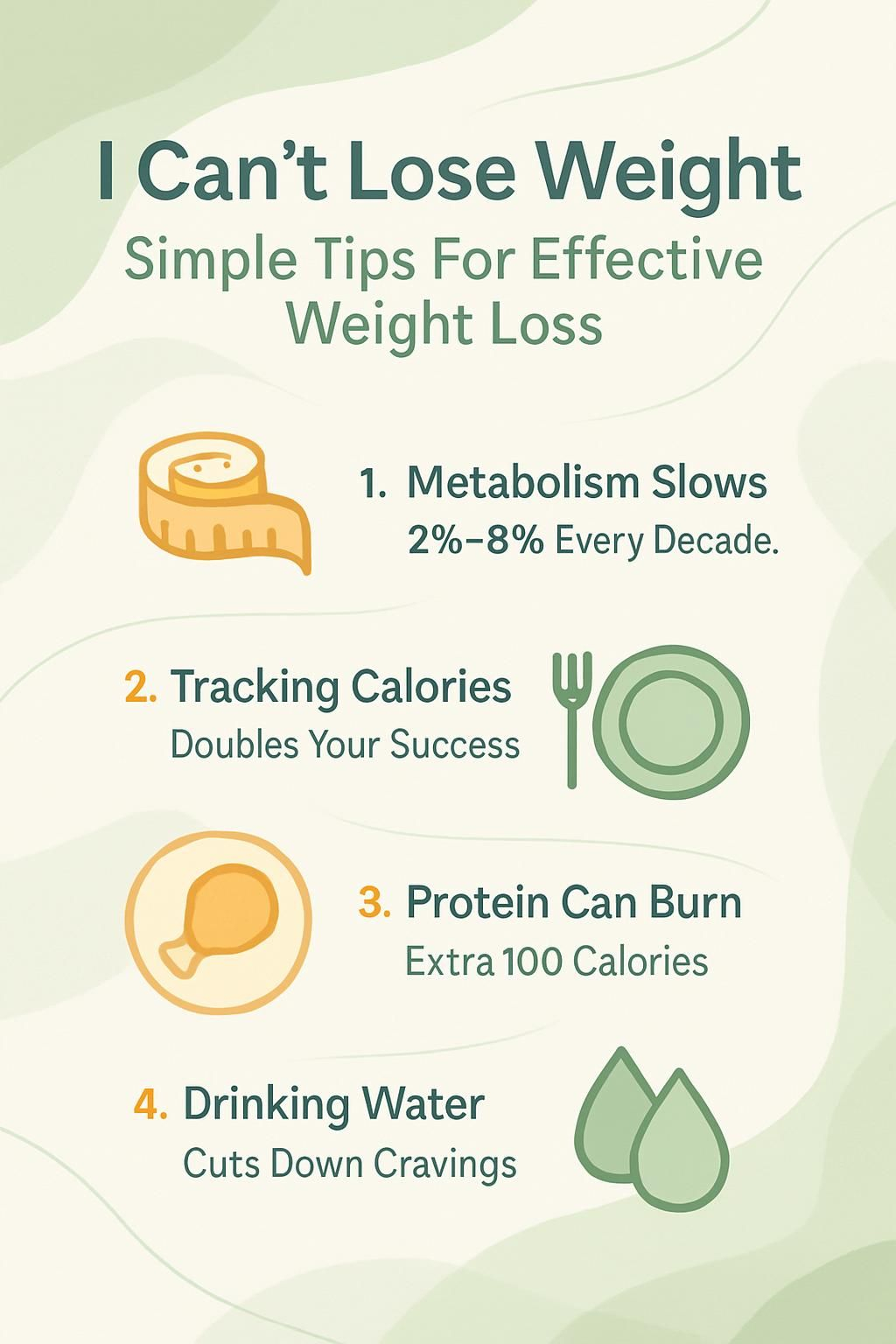I Can’t Lose Weight: Simple Tips For Effective Weight Loss
Our Nutrition Assistant AI Suite will transform your body. You will lose fat, get toned, and build muscle. Gain confidence and optimal health.
You might think, “I can’t lose weight,” even after cutting portions and moving more. If weight loss has stalled, hidden factors like stress, sleep, and metabolism can slow progress.
This guide explains the most common reasons you hit a weight loss plateau, then gives clear steps to reset your plan. You will learn how to set healthy weight loss goals, tweak your routine, and build habits that stick.
Key Takeaways
- Metabolism drops with age, roughly 2% to 8% per decade. Muscle loss, poor sleep, and stress raise hunger hormones like ghrelin, which can stall weight loss.
- Tracking calories improves results. A 2023 National Institutes of Health analysis found people who logged intake were about twice as likely to meet goals compared with those who did not track [1].
- Higher protein helps protect muscle and can increase daily calorie burn by about 100 calories. Trials show greater average weight loss, near 11 pounds over 12 weeks, versus low protein diets [2].
- Drinking about eight 8-ounce glasses of water a day, or two liters, can support metabolism and reduce cravings for sugary or diet drinks that hinder progress [3].
- Combining strength training with cardio prevents plateaus better than cardio alone and can raise resting metabolism by 7% to 10% over time [4].

Why Can’t I Lose Weight?

Many people try to lose weight and still feel stuck. Science explains why your weight loss efforts may not match your hard work.
What are common misconceptions about losing weight?
One myth is that eating far fewer calories always speeds fat loss. If intake drops too low, your body defends itself by slowing metabolism, which can stall progress.
Some expect quick fixes or medication to do the job without exercise or a balanced diet. Drugs like GLP-1s can help under medical care, but they are tools, not silver bullets.
Crash diets promise fast results, yet safe and effective weight loss usually averages 1 to 2 pounds per week. Calories also differ in quality. Two hundred calories from soda act very differently in your body than 200 calories from lean protein or whole grains.
After pregnancy, shifts in hormones and schedules can change energy, appetite, and fat storage. That makes steady routines harder, even with popular weight loss programs.
You might skip meals and sip diet sodas to speed results. Instead, cravings rise, energy falls, and progress slows.
What causes weight loss plateaus?
As body weight drops, your daily calorie burn falls because a smaller body uses less energy. Losing muscle during dieting lowers metabolism too, since muscle burns more calories than fat.
Age reduces metabolism by about 2% to 8% per decade, which makes long term weight management tougher. Doing the same workout for months also leads to adaptation, so fewer calories burn per session.
Eating too little can shift your body into self-protection mode. It conserves energy and stores fat more easily. Set point theory suggests your brain defends a preferred weight by cutting energy output or increasing ghrelin, the hunger hormone.
To push past a plateau, adjust both food choices and activity. Small changes across both areas work better than a single big change.
Possible Reasons You’re Struggling to Lose Weight
Even with a low-calorie diet and consistent exercise, progress can stall. These common roadblocks make losing weight even harder.
How does insulin resistance affect weight loss?
Insulin resistance means your cells do not respond well to insulin. Blood sugar stays high and the body stores more of it as fat in adipose tissue.
That can blunt results even if you eat fewer calories or work out. It also raises the risk of type 2 diabetes. A simple fasting blood sugar test can help flag this issue.
Actions that help include strength training, daily movement, and an eating pattern rich in whole foods, lean protein, vegetables, and water. Some people may also need medication, guided by a clinician.
If you are stuck despite consistent effort, ask your healthcare provider about insulin resistance and other possible causes.
How does stress impact your body and weight?
Chronic stress raises cortisol, a stress hormone. High cortisol shifts your body to store more fat, often around the abdomen.
Stress also pushes cravings for sugary snacks and processed foods. Emotional eating becomes more common, which disrupts a healthy plan and makes weight management harder.
Managing stress supports better sleep and steadier choices. Both are linked to better weight loss outcomes in research [5].
Can poor or insufficient sleep prevent weight loss?
Yes. Getting less than 7 to 9 hours a night raises ghrelin, the hormone that drives hunger. People who sleep too little often eat about 300 extra calories a day and crave sugary foods.
Sleep loss lowers daytime energy, so workouts and steps fall. That reduces the calories you burn with movement and aerobic exercise.
Irregular sleep also raises cortisol, which nudges weight gain. Consistent, high quality sleep helps align hunger and stress signals so you can lose weight more easily.
Drinks matter too. Sugary and diet beverages can make this problem worse.
Why do sugary or artificially sweetened drinks hinder weight loss?
Sugary drinks add calories without fullness, which leads to weight gain over time. They also affect insulin and can raise the risk of insulin resistance, which makes fat loss harder.
Diet sodas and zero calorie drinks can increase ghrelin. That raises appetite and total calorie intake at later meals. Carbonated diet drinks may also boost hunger hormones.
Plain water is the best choice for hydration. If you miss flavor, infuse water with mint, lemon, or berries. This simple swap cuts liquid calories and curbs cravings.
How do processed or unhealthy foods affect weight loss?
Processed snacks, like chips and candy, pack lots of calories with little nutrition. Added sugar, salt, and refined oils make overeating very easy.
Snacks can make up a quarter of daily intake in typical diets. That is a big barrier if you need to lose weight. Keep better options on hand such as fruit, vegetables with yogurt dip, nuts, air popped popcorn, or rice cakes.
Stock your kitchen for success. If it is not in the house, it is harder to eat in a weak moment.
Why is protein important for weight loss?
Protein protects muscle while you reduce calories. Keeping muscle helps you maintain a higher resting metabolism.
Higher protein diets can raise daily calorie burn by about 100 calories and improve average weight loss results, according to clinical trials [2].
Start your day with a protein rich breakfast. Try eggs and whole wheat toast, Greek yogurt with banana, or cottage cheese and fruit. Feeling full longer reduces snacking and helps control total calories.
How do skipping meals or frequent snacking affect weight loss?
Skipping breakfast often leads to bigger hunger later in the day. That can push you to eat more than planned. Many dietitians suggest breakfast within two hours of waking to steady blood sugar and appetite.
Late night eating is another trap. Eating within two hours of bed keeps insulin and blood sugar higher during sleep, which can hinder fat burning.
Frequent, distracted snacking adds hidden calories. Close the kitchen two hours before bedtime and plan regular meals. A simple routine keeps energy steady and supports healthy habits.
How does hydration influence weight loss?
Thirst can feel like hunger. Drinking enough water helps control cravings and supports metabolism. In one study, two cups before meals helped people lose more weight over twelve weeks [3].
Aim for fruits and vegetables at least five times a day alongside good hydration. Add fruit slices or herbs to water if you want more flavor.
Better hydration also reduces the chance of binge eating triggered by dehydration signals that mimic hunger.
What impact does alcohol consumption have on weight loss?
Alcohol adds liquid calories fast, and it does not make you full. A beer can be 150 calories. A shot of liquor is near 97 calories, while mixed drinks can be much higher.
Alcohol changes metabolism, so you burn less fat and store more glycogen. It also lowers self control, which makes high calorie snacking more likely. Cutting back helps you hold a calorie deficit and stick to your plan.
Are unrealistic weight loss expectations a problem?
Yes. Goals like 20 pounds in two weeks or success without exercise set you up for burnout. A safe, sustainable rate is 1 to 2 pounds per week.
Some men may lose faster early due to higher muscle mass, but this often evens out. Extreme cuts can backfire by slowing metabolism and increasing hunger.
Your body also fights big drops with set point defenses. Smaller, steady goals protect mental health and help you maintain a healthy weight.
The Role of Exercise in Weight Loss
Think of exercise as your daily spark, it keeps metabolism active and mood steady.
How does not exercising enough affect weight loss?
Falling short of 150 minutes of weekly moderate activity slows progress. Your body needs regular movement to burn calories and preserve muscle.
Moving less also lowers insulin sensitivity, which matters if you have prediabetes or a history of obesity. Raising steps above 8,000 to 10,000 a day and adding short workouts can break a long plateau.
Consistent exercise pairs best with good sleep and a balanced diet. Together, these habits shift your results.
Why is strength training important alongside cardio?
Strength training builds lean muscle, which raises resting metabolism. You burn more calories all day, not just during exercise.
Cardio burns calories now. Lifting weights adds an afterburn effect that lasts for hours. Research shows the combination reduces plateaus better than doing only one type of workout [4].
Two or three weekly sessions that train all major muscles are enough for most people. Progress with slightly heavier weights or more repetitions over time.
How does consistency in exercise improve weight loss?
Consistency beats intensity. A steady routine prevents quick adaptation and supports long term fat loss.
Adults who exercise at least three times a week lose more weight and keep it off more often. If needed, try exercise “snacks,” short bursts of movement across the day, to raise total activity.
Coaches can help tailor a safe plan to your current weight and goals. Daily movement also lifts energy and mood, which keeps you going.
Medical and Genetic Factors Hindering Weight Loss
Health conditions and genetics can affect results even with a strong plan. Understanding these factors helps you choose the right steps.
Can thyroid problems prevent weight loss?
Yes. Low thyroid function, called hypothyroidism, slows metabolism and can cause mild weight gain, often from fluid retention. High thyroid function, hyperthyroidism, speeds metabolism and can cause weight loss or extra hunger.
About 5% of adults over 60 have hypothyroidism. If you notice changes in weight with fatigue, hair loss, or cold intolerance, talk with your doctor. Blood tests guide treatment so you can adjust your weight management plan safely.
How do hormonal imbalances affect weight loss?
Hormones guide hunger and fullness. Ghrelin increases hunger. Leptin signals fullness. In people with extra weight, leptin can be high, but the brain may ignore it, a problem called leptin resistance.
Conditions like polycystic ovary syndrome and insulin resistance disrupt these signals and may slow metabolism. Medication side effects can also shift hormones and weight. Blood tests can uncover issues so your plan fits your needs.
Which medications can cause weight gain?
Several medicines can lead to weight gain, including some allergy drugs, birth control, antidepressants like SSRIs, insulin and sulfonylureas for diabetes, anti seizure drugs, beta blockers for blood pressure, lithium, and certain antipsychotics. Some antidepressants are linked with 5 to 10 pounds of gain within months.
Do not stop any medication on your own. If you suspect a problem, ask your clinician about alternatives with fewer weight related effects.
How do genetics and metabolism influence weight loss?
Genes shape hunger, taste, fat storage, and how fast you burn energy. Two people can eat similar foods and get different results.
Metabolism also changes with age. Muscle tends to drop over time, and that slows calorie burn by about 2% to 8% per decade. As you lose weight, your body needs fewer calories, so progress often slows.
If you hit a plateau, tighten tracking, protect muscle with protein and strength work, and adjust calories slowly.
Simple Tips to Improve Weight Loss
Small, steady changes work better than big swings. Start with one or two, then build.
How can tracking calories help weight loss?
Tracking shows what you are really eating and drinking each day. Use an app or a simple journal. That clarity helps you create a calorie deficit that leads to weight loss.
People who track intake are about twice as likely to meet goals, based on NIH reports [1]. Track snacks, sauces, sugary drinks, and alcohol. Those hidden calories matter.
Share your plan with a friend for accountability. Pair tracking with whole foods for even better weight control.
Why focus on whole, unprocessed foods?
Fruits, vegetables, lean protein, nuts, and whole grains deliver fiber and key nutrients with fewer empty calories. People who eat at least five portions of produce daily lower the risk of heart disease [6].
Whole foods keep you full longer than processed snacks. For lunch, grilled chicken with brown rice and vegetables beats a fast food combo for energy and appetite control.
How does adding more protein aid weight loss?
Protein supports muscle building and raises the calories you burn while digesting food, a process called the thermic effect. Studies show higher protein diets can lead to about 11 more pounds lost over 12 weeks than lower protein plans [2].
Choose protein at each meal. It helps maintain metabolism during calorie restriction and reduces cravings between meals.
How much water should you drink to stay hydrated?
Aim for at least eight 8-ounce glasses daily, about two liters. Needs vary with size, activity, climate, and salt intake. Plain water is best since it adds zero calories or sugar.
Flavor water with lemon, berries, or mint to make it easier to drink enough. Carry a reusable bottle so you can track your intake across the day.
What are effective ways to reduce stress?
Short breathing drills and mindfulness lower cortisol. Yoga, walks, and short outdoor breaks reduce anxiety and improve sleep.
Connect with a friend or family member to talk through tough days. Dim screens an hour before bed to calm your mind. These small choices make healthy eating and exercise easier.
How much sleep do you need for weight loss?
Target 7 to 8 hours of sleep each night with a steady schedule. Deep sleep resets hormones that manage hunger and fullness. Poor sleep raises ghrelin, which can add about 300 calories a day.
Good sleep also reduces stress and late night snacking. Regular patterns help your body burn fat more efficiently.
Why add strength training to your workouts?
Strength training helps you lose fat without losing muscle. More muscle means a higher resting metabolism, so you burn more calories even at rest.
Progress your routine every few weeks with a bit more weight or different exercises. This variety keeps results coming and prevents plateaus.
How does limiting alcohol support weight loss?
Cutting back on alcohol lowers calorie intake and reduces late night snacking. One glass of wine can be about 120 calories, and mixed drinks often run higher.
Fewer drinks also make it easier to hit workouts and stay on your meal plan. If weight loss is a priority, set a weekly drink limit that fits your goals.
How to Stay Motivated During Your Weight Loss Journey
Motivation grows with proof. Track wins you can see and feel.
How can celebrating small milestones help motivation?
Each small win builds momentum. Research shows people who recognize progress are more likely to stick with health plans.
Pick non food rewards that feel good, like new workout gear or a relaxing playlist. Swap chips for fruit for one week, or choose water over soda, then celebrate that step.
How do you set realistic and achievable weight loss goals?
Choose a safe pace, about 1 to 2 pounds per week. Track progress weekly so you see trends, not just day to day swings.
Make goals specific and positive. Say, “I will add vegetables to lunch five days this week,” instead of “eat better.” Adjust based on what works for you.
Where can you find support or accountability partners?
Tell a friend, join a local class, or connect in an online community. Social support increases follow through.
Free NHS weight management resources can offer structure, and self referral options make access simple. A supportive group keeps you consistent when motivation dips.
FAQs About Weight Loss Challenges
These answers address common barriers and help you make smarter choices.
Can health conditions block weight loss?
Yes. Heart disease, thyroid disorders, sleep apnea, and binge eating disorder can slow or block weight loss. Hormone issues reduce metabolism. Sleep apnea disrupts rest and hunger hormones, which increases calorie intake.
If progress stalls despite steady habits, ask your healthcare professional about screening. With treatment, plans become easier to follow.
Summary table:
| Condition | Impact on Weight Loss |
|---|---|
| Heart disease | Limits exercise capacity |
| Thyroid disorders | Lowers or raises metabolism |
| Sleep apnea | Worsens sleep, triggers overeating |
| Binge eating disorder | Increases calorie intake |
Early checks can improve safety and results. Seek medical care for symptoms that persist. If you have an eating disorder, contact a licensed clinician right away.
How much exercise do you need to lose weight?
Aim for at least 150 minutes of moderate exercise per week, such as brisk walking or easy cycling, based on CDC and American Heart Association guidance. Break it into shorter sessions if needed.
Adding vigorous sessions, like running or fast cycling, burns more calories in less time and can speed results. Consistency matters most.
Should you avoid carbohydrates completely?
No. You do not need to cut all carbs to lose weight. Choose complex carbohydrates, such as brown rice, oats, and quinoa. These whole grains offer fiber and steady energy.
People who eat more whole grains often have lower body weight than those who rely on refined carbs. Cutting all carbs may cause low energy or nutrient gaps.
What role does metabolism play in weight loss?
Metabolism controls how fast you use energy from food. It declines with age, near 2% to 8% per decade, and it drops as you lose weight because a smaller body needs less energy.
Support metabolism with strength training, enough protein, regular steps, and quality sleep.
Conclusion
Effective weight loss comes from steady habits and small changes. Focus on whole foods, sleep, stress control, hydration, and exercise. Track what you eat so your calorie intake fits your goals. Adjust as your metabolism and body weight change.
If progress stalls, review the possible causes in this guide or talk with your doctor or a registered dietitian. Health conditions, medications, and genetics can affect your results. You can lose weight with a plan that fits your life, one step at a time.
References: [1] NIH and related tracking research; [2] American Journal of Clinical Nutrition on higher protein intake and weight loss; [3] Studies on pre meal water intake and weight loss; [4] Evidence on combining resistance training with cardio and resting metabolism; [5] Research on stress, cortisol, sleep, and appetite; [6] Dietary guidance on produce intake and heart health from major public health agencies. This content is educational and does not replace medical advice. Seek personalized guidance from a licensed clinician.
FAQs
1. Why do I struggle to lose body fat even with regular exercise and healthy eating?
Many people find it hard to shed extra weight due to factors like slow metabolism, hormonal changes, or hidden calories in their meals. Research from the National Institutes of Health shows that sleep quality, stress levels, and certain medications can also impact progress toward a lower body mass index.
2. What are simple tips for effective weight loss supported by science?
Eat more whole foods such as fruits, vegetables, lean meats, and grains; keep track of your daily calorie intake; drink water before meals; get at least seven hours of sleep each night; and move often throughout the day. Studies published in JAMA found that these habits help most people reach a healthier size over time.
3. How important is tracking food portions for losing excess pounds?
Tracking what you eat helps many individuals notice patterns or overeating they might miss otherwise. A study in Obesity Reviews found those who kept food logs lost more inches around their waist than those who did not record their intake.
4. Can personal experience help motivate lasting lifestyle changes for weight management?
Yes; sharing stories about small wins or setbacks makes goals feel real and possible to achieve. For example, one reader wrote about swapping soda for water every lunch break which led them to drop ten pounds over three months while feeling less tired during workdays.
Summary: Losing unwanted fat requires attention to diet choices, portion sizes, physical activity level, rest quality, and emotional support from others facing similar challenges. Evidence supports using practical steps like meal tracking along with encouragement from shared experiences as part of an effective plan for long-term success.







